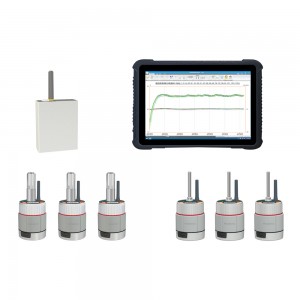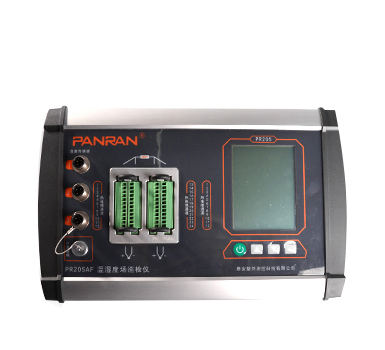PR231 Precision Multifunction Calibrator
The PR235 series multi-function calibrator can measure and output a variety of electrical and temperature values, with a built-in isolated LOOP power supply. It adopts an intelligent operating system and combines touch screen and mechanical key operations, featuring rich functions and easy operation. In terms of hardware, it uses a new port protection technology to achieve 300V over-voltage protection for measurement and output ports, bringing more excellent safety and convenient operability for on-site calibration work.
Technical Features
Excellent port protection performance, both the output and measurement terminals can withstand a maximum of 300V AC high voltage mis-connection without causing hardware damage. For a long time, the calibration work of field instruments usually requires operators to carefully distinguish between strong and weak electricity, and wiring errors may cause serious hardware damage. The new hardware protection design provides a strong guarantee for protecting operators and the calibrator.
Humanized design, adopting an embedded intelligent operating system that supports operations such as screen sliding. It simplifies the operation interface while having rich software functions. It uses a touch screen + mechanical key human-computer interaction method. The capacitive touch screen can bring an operation experience comparable to that of a smartphone, and the mechanical keys help improve the accuracy of operation in harsh environments or when wearing gloves. In addition, the calibrator is also designed with a flashlight function to provide illumination in low-light environments.
Three reference junction modes can be selected: built-in, external, and custom. In the external mode, it can automatically match the intelligent reference junction. The intelligent reference junction has a built-in temperature sensor with a correction value and is made of tellurium copper. It can be used in combination or split into two independent fixtures according to needs. The unique design of the clamp mouth enables it to easily bite onto conventional wires and nuts, obtaining a more accurate reference junction temperature with more convenient operation.
Measurement intelligence, electrical measurement with automatic range, and in the measurement of resistance or RTD function automatically recognizes the measured connection mode, eliminating the cumbersome operation of selecting the range and wiring mode in the measurement process.
Diversified output setting methods, values can be entered through the touch screen, set by pressing keys digit by digit, and also has three stepping functions: ramp, step, and sine, and the period and step length of the step can be freely set.
Measurement toolbox, with multiple built-in small programs, can perform forward and reverse conversions between temperature values and electrical values of thermocouples and resistance thermometers, and supports the mutual conversion of more than 20 physical quantities in different units.
Curve display and data analysis function, can be used as a data recorder, record and display the measurement curve in real-time, and perform diverse data analysis such as standard deviation, maximum, minimum, and average value on the recorded data.
Task function (Model A, Model B), with built-in calibration task applications for temperature transmitters, temperature switches, and temperature instruments. Tasks can be quickly created or templates selected on-site, with automatic error determination. After the task is completed, the calibration process and result data can be output.
HART communication function (Model A), with a built-in 250Ω resistor, combined with the built-in isolated LOOP power supply, it can communicate with HART transmitters without other peripherals and can set or adjust the internal parameters of the transmitter.
Expansion function(Model A, Model B), supporting pressure measurement, humidity measurement and other modules. After the module is inserted into the port, the calibrator automatically recognizes it and enters the three-screen mode without affecting the original measurement and output functions.
General Technical Parameters
|
Item |
Parameter |
||
|
Model |
PR235A |
PR235B |
PR235C |
|
Task function |
√ |
√ |
× |
|
Standard temperature measurement |
√ |
√ |
× |
|
Measuring temperature sensor supports multi-point temperature correction |
√ |
√ |
× |
|
Bluetooth communication |
√ |
√ |
× |
|
HART function |
√ |
× |
× |
|
Built-in 250Ω resistor |
√ |
× |
× |
|
Appearancedimensions |
200mm×110mm×55mm |
||
|
Weight |
790g |
||
|
Screen specifications |
4.0-inch industrial touch screen, resolution 720×720 pixels |
||
|
Battery capacity |
11.1V 2800mAh rechargeable lithium battery |
||
|
Continuous working time |
≥13 hrs |
||
|
Workenvironment |
Operating temperature range:(5~35)℃,non-condensing |
||
|
Power supply |
220VAC±10%,50Hz |
||
|
Calibration cycle |
1 year |
||
|
Note: √ means this function is included, × means this function is not included |
|||
Electrical Technical Parameters
|
Measurement functions |
|||||
|
Function |
Range |
Measuring Range |
Resolution |
Accuracy |
Remarks |
|
Voltage |
100mV |
-120.0000mV~120.0000mV |
0.1μV |
0.015%RD+0.005mV |
Inputimpedance ≥500MΩ |
|
1V |
-1.200000V~1.200000V |
1.0μV |
0.015%RD+0.00005V |
||
|
50V |
-5.0000V~50.0000V |
0.1mV |
0.015%RD+0.002V |
Inputimpedance ≥1MΩ |
|
|
Current |
50mA |
-50.0000mA~50.0000mA |
0.1μA |
0.015%RD+0.003mA |
10Ω current sensing resistor |
|
Four-wire resistance |
100Ω |
0.0000Ω~120.0000Ω |
0.1mΩ |
0.01%RD+0.007Ω |
1.0mA excitation current |
|
1kΩ |
0.000000kΩ~1.200000kΩ |
1.0mΩ |
0.015%RD+0.00002kΩ |
||
|
10kΩ |
0.00000kΩ~12.00000kΩ |
10mΩ |
0.015%RD+0.0002kΩ |
0.1mA excitation current |
|
|
Three-wire resistance |
The range, scope and resolution are the same as those of the four-wire resistance, the accuracy of the 100Ω range is increased by 0.01%FS on the basis of the four-wire resistance. The accuracy of the 1kΩ and 10kΩ ranges is increased by 0.005%FS on the basis of the four-wire resistance. |
Note 1 |
|||
|
Two-wire resistance |
The range, scope and resolution are the same as those of the four-wire resistance, the accuracy of the 100Ω range is increased by 0.02%FS on the basis of the four-wire resistance. The accuracy of the 1kΩ and 10kΩ ranges is increased by 0.01%FS on the basis of the four-wire resistance. |
Note 2 |
|||
|
Standard temperature |
SPRT25,SPRT100, resolution 0.001℃, see Table 1 for details. |
||||
|
Thermocouple |
S, R, B, K, N, J, E, T, EA2, Wre3-25, Wre5-26, resolution 0.01℃, see Table 3 for details. |
||||
|
Resistance Thermometer |
Pt10, Pt100, Pt200, Cu50, Cu100, Pt500, Pt1000, Ni100(617),Ni100(618),Ni120,Ni1000, resolution 0.001℃, see Table1 for details. |
||||
|
Frequency |
100Hz |
0.050Hz~120.000Hz |
0.001Hz |
0.005%FS |
Input voltage range: 3.0V~36V |
|
1kHz |
0.00050kHz~1.20000kHz |
0.01Hz |
0.01%FS |
||
|
10kHz |
0.0500Hz~12.0000kHz |
0.1Hz |
0.01%FS |
||
|
100kHz |
0.050kHz~120.000kHz |
1.0Hz |
0.1%FS |
||
|
ρ value |
1.0%~99.0% |
0.1% |
0.5% |
100Hz, 1kHz are effective. |
|
|
Switch value |
/ |
ON/OFF |
/ |
/ |
Trigger delay ≤20mS |
Note 1: The three test wires should use the same specifications as much as possible to ensure that the test wires have the same wire resistance.
Note 2: Attention should be paid to the influence of the wire resistance of the test wire on the measurement result. The influence of the wire resistance on the measurement result can be reduced by connecting the test wires in parallel.
Note 3: The above technical parameters are based on an ambient temperature of 23℃±5℃.















